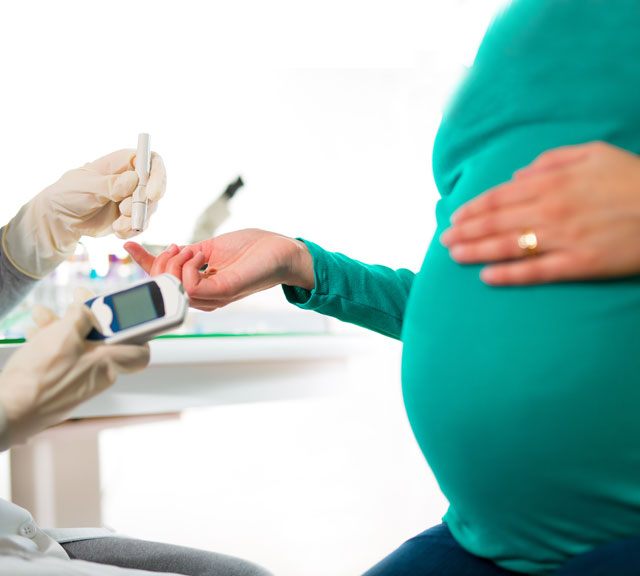The Risks of Diabetes That Starts During Pregnancy

Find Your Perfect Match
Answer a few questions and we'll provide you with a list of primary care providers that best fit your needs.
Big newborn babies are not necessarily healthy babies, as you might assume. Not when their size results from gestational diabetes.
Gestational diabetes is diabetes that develops during pregnancy, usually late term. As with other types of diabetes, blood glucose, or blood sugar, exceeds normal levels.
In gestational diabetes, the expectant mother’s body doesn’t properly use the hormone insulin to convert glucose into energy for herself and her developing baby. Called insulin resistance, this problem also happens in type 2 diabetes.
This leaves excess sugar in the bloodstream during pregnancy. Left untreated or uncontrolled, it can negatively impact the health of the baby and mother, says David S. McKenna, MD, a Maternal-Fetal Medicine specialist with Perinatal Partners.
What Causes Gestational Diabetes
Natural hormones that help your baby develop may block the ability of your insulin to convert glucose in the bloodstream to energy, Dr. McKenna said. This raises the level of glucose in your bloodstream, which the baby shares with you through the placenta.
In addition, he said, mothers who develop gestational diabetes “probably have a genetic predisposition to developing type 2 diabetes.” This predisposition may be why mothers who have gestational diabetes are at high risk of developing type 2 diabetes in later life.
How Untreated Gestational Diabetes Affects Baby
“Glucose freely crosses the placenta (which nourishes the developing baby), so whatever mom’s blood sugar is, the baby’s is as well,” Dr. McKenna said.
Elevated blood sugar increases the size of the baby. “At first, people think, oh, a big fat baby is a healthy baby. But this is not normal growth.”
Large babies have increased risk of delivery complications and injury. And they’re more likely to require delivery by Cesarean section.
Babies exposed to untreated gestational diabetes also face:
- Low blood sugar levels immediately after delivery. “They’re used to seeing a high level from mom, so their body is all revved up to treat that with their own insulin,” Dr. McKenna says. Then when the umbilical cord is cut, the excess insulin in their system causes blood sugar to plummet.
- Brain seizures and other health problems due to this drop in blood sugar. The baby may require glucose infusions at the start.
- Lungs that are not normally developed, making them “behave like a preemie,” Dr. McKenna said. “They could weigh 10 pounds or more and still have respiratory problems like a preemie does.”
- Increased lifetime risk of obesity and chronic diseases such as cardiovascular disease and type 2 diabetes
How Gestational Diabetes Affects Mom
In most cases, gestational diabetes ends at childbirth. But women who have gestational diabetes are at high risk of developing type 2 diabetes later.
For this reason, if you have had gestational diabetes your doctor will recommend that you have a test for type 2 diabetes or prediabetes, at 6 to 12 weeks after your delivery.
Treating Gestational Diabetes
Treating gestational diabetes means taking steps to keep your blood glucose at a normal level throughout your pregnancy.
“At first, people think, oh, a big fat baby is a healthy baby. But this is not normal growth.”
“The baby just sees the glucose that mom has, so if mom can keep her glucose at a normal level, the risks for all those complications go down,” Dr. McKenna said.
Dr. McKenna said that treatment of gestational diabetes includes:
- Dietary counseling on healthful eating during pregnancy — and after. “This is often a huge revelation to a lot of moms because people don’t realize how unhealthy some of their diets are, in particular with prepared foods, which often contain sugar,” Dr. McKenna said.
- Medication, if blood sugar can’t be lowered sufficiently through diet or other lifestyle changes
- Increased surveillance of the baby during pregnancy. This includes additional testing and frequent ultrasounds to check the baby’s development.
For women with gestational diabetes who require medication, Dr. McKenna added that he recommends delivering the baby at the 39th week, the week before the due date, to prevent complications.
He also recommends breastfeeding for the baby’s and mother’s well-being. “One of the best things they can do is breastfeed,” he said. “Breastfeeding decreases their risk of developing type 2 diabetes.”
Find Your Perfect Match
Answer a few questions and we'll provide you with a list of primary care providers that best fit your needs.
Source: National Institute of Diabetes and Digestive and Kidney Diseases; American Diabetes Association; David S. McKenna, MD, Perinatal Partners


